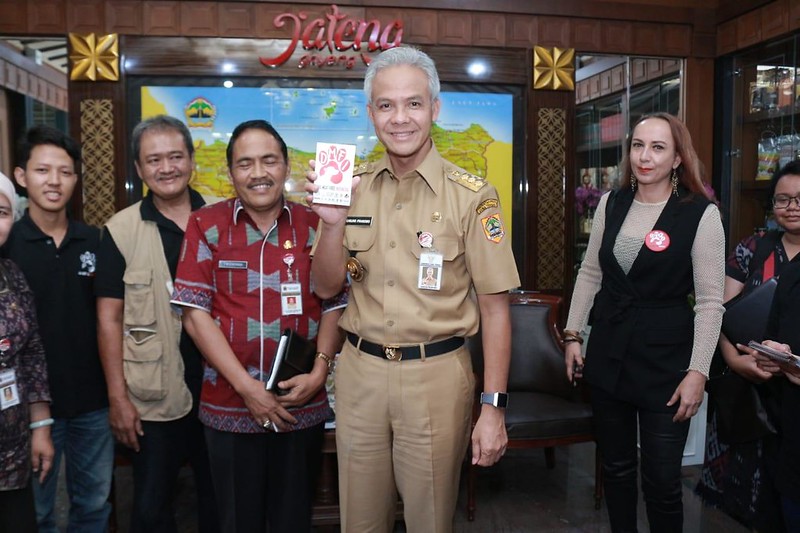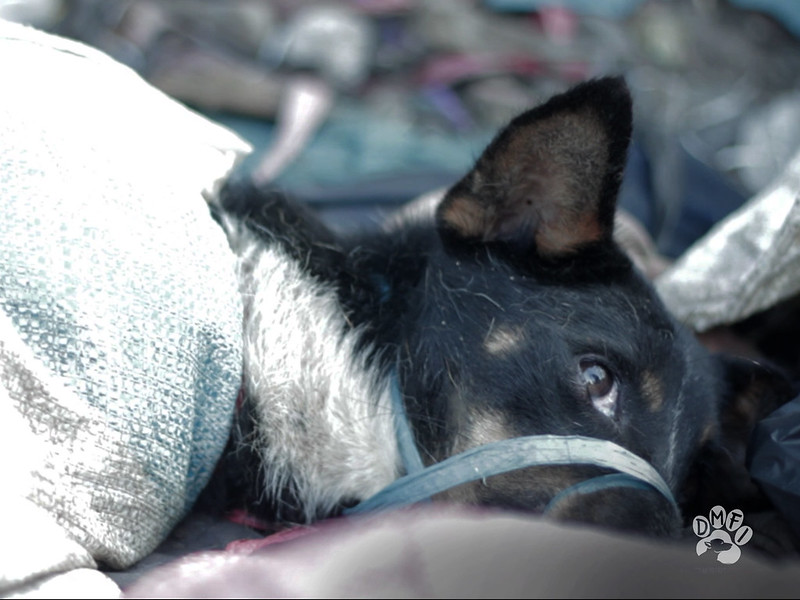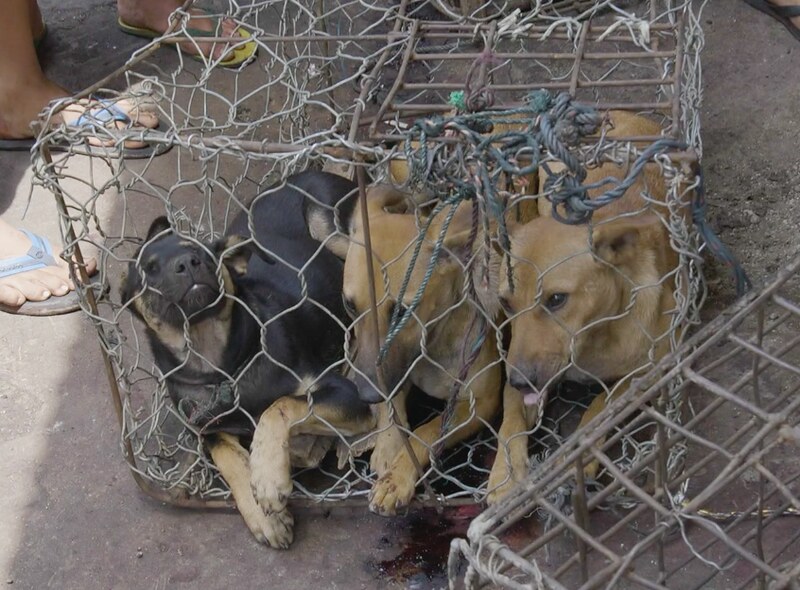Local authorities pledge to tackle the cruel and dangerous dog meat trade in Central Java, Karanganyer and Jogja, Indonesia
19 December 2019
The Dog Meat Free Indonesia (DMFI) coalition, of which Animals Asia is a part, have achieved some fantastic steps forward in the campaign with key endorsements from representatives of the local government.
On the 21 November DMFI representatives met with the Mayor and Deputy Mayor of Jogja as well as the Department of Agriculture, a legal team of advisors, and representatives of law enforcement agencies.
These meetings helped finalise a Memorandum of Understanding (MOU) between DMFI and the City as well as details of a public awareness event held later in the month. The MOU concerned the implementation of regulations that will be used to close dog meat trading restaurants and other facilities that perpetuate the trade. The DMFI coalition is pleased to support and collaborate with the Deputy Mayor in the revision and strengthening of these regulations to ensure impactful change.
The second part of the city’s socialization plan to end dog meat consumption city-wide has begun with a billboard campaign with messaging which is the first of its kind in Jogja. The billboards, created in conjunction with the government, promote key animal welfare principles and clearly state that dogs are not for consumption.
The billboards says:
“Dogs are loving animals; They are Man’s best friends. Not food.”
This is followed by listing of the 5 Freedoms: Freedom from hunger and thirst; Freedom from pain, injury and disease; Freedom from discomfort; Freedom from fear and distress; and Freedom to express normal behaviour.
Thanks to the MOU with the City of Jogja Government, authorities are now compelled to take immediate action upon receipt of proven reports from the public regarding dog meat being sold for consumption. This is a huge step forward for the campaign.
Separately, following a series of meetings with the Regent of Karanganyer; Mr. Juliatmono, the coalition received confirmation that regulations against dog meat have been passed and are being enforced and that Mr. Juliatmono pledged “zero tolerance” of the trade! These regulations could save around 2,000 dogs a month and protecting local communities from rabies.
Mr Juliatmono said:
“The government believes that dogs are not animals for consumption. Let's take care of these dogs. Love them. (…) Let's continue to solve this issue because we all care for these dogs”
The coalition also discussed the urgent need for education on responsible pet ownership which DMFI hopes to help provide in collaboration with Mr Juliatmono’s team.
On 29 November DMFI coalition had a meeting with the Head of Agriculture of Central Java MMr. Ir. Lalu Muhamad Syafriadi, M.M. and the Head of the Veterinary Public Health Division to discuss the dangers of the dog meat trade and possible solutions. They stated that the dog meat trade is illegal and that enforcement is needed as well as education and mass canine sterilisation. A directive is in the works and soon DMFI will have a follow up meeting with all the relevant departments, including law enforcement to prepare in more detail. Mr Lalu stated that the department’s principal concerns are:
-
The role the dog meat trade plays in rabies transmission
-
Animal cruelty
-
The negative impact on Central Java’s reputation and tourism
Mr. Ir. Lalu Muhamad Syafriadi, M.M., Head of Agriculture of Central Java said:
“I urge all dog butchers, dog meat dealers, dog meat providers, and dog meat consumers to listen. I must emphasize that under regulation law of Article 18 of 2012 regarding food, dogs are not fit to be consumed. Secondly, in the regulation law Article 41 of 2012 concerning animal husbandry, there will be a lawful punishment for anyone who insists on distributing these dogs.”
On 3 December, following on from the release of the DMFI coalition’s investigation into Central Java’s rampant dog meat trade, where an estimated 13,700 dogs are traded and slaughtered in the city of Solo alone each month, Governor Ganjar Pranowo met with coalition representatives to discuss the trade’s threat to public health and safety as well as concerns for the inherent animal cruelty.
Central Java has not had any cases of rabies since 1995, and has held the status of being “rabies free” since 1997. But the Coalition warns that this status is under threat as the demand for dog meat in the province encourages the mass and unregulated trade in dogs of unknown disease and vaccination status from other provinces, notably West Java where rabies is still endemic. This is in contravention to national rabies prevention regulations as well as recommendations from all leading human and animal health experts, including the World Health Organization (WHO).
DMFI’s latest investigations in Java suggest that Solo is an epicentre for much of the trade that operates on this central island, encouraging an island-wide trade in dogs to supply the city’s 82 restaurants openly advertising the meat. The treatment of animals filmed by DMFI is not only extremely brutal, but also flouts public health and safety regulations designed to protect citizens from deadly rabies transmission and the spread of diseases that can be transmitted from animals to people. DMFI’s investigations have shown that the trade routinely relies on illegal, profit-driven and dangerous activities, including the trans-provincial long-distance trade in dogs.
Karin Franken of the DMFI coalition said:
“We are optimistic that the Governor of Central Java will take strong and urgent actions to ensure prohibition rules are passed to end the trade in, slaughtering and consumption of dogs. We know that only a minority of Indonesians consume dog meat, yet the trade threatens the health and safety of the entire nation, not to mention results in the immeasurable and unimaginable suffering of tens of thousands of dogs throughout Indonesia each month. It is a cruel and dangerous trade that must stop, and the DMFI stands ready to help provide practical and on-the-ground support to secure the dual aims of eliminating both the dog and cat meat trade and rabies.”
In a country where rabies remains endemic in all but 8 of its 34 provinces after West Nusa Tenggara lost its rabies-free status earlier this year, campaigners warn it is only a matter of time before more people die of this disease that the government’s Ministry of Health had pledged to eliminate by 2020.
In Medan, North Sumatra DMFI representatives have been interviewing tourists to capture their attitudes towards the dog meat trade and on the 11 & 12 December the Department of Agriculture in North Sumatra held a seminar on how to eliminate rabies by 2022. DMFI presented information about the role the dog meat trade plays in facilitating the transmission of rabies; as well as the negative impact the trade has on the tourism industry.
Animals Asia is proud to be part of the DMFI coalition which includes: Animal Friends Jogja, Change For Animals Foundation, FOUR PAWS, Humane Society International and Jakarta Animal Aid Network. Together we will keep campaigning until Indonesia is totally dog meat free.
BACK








